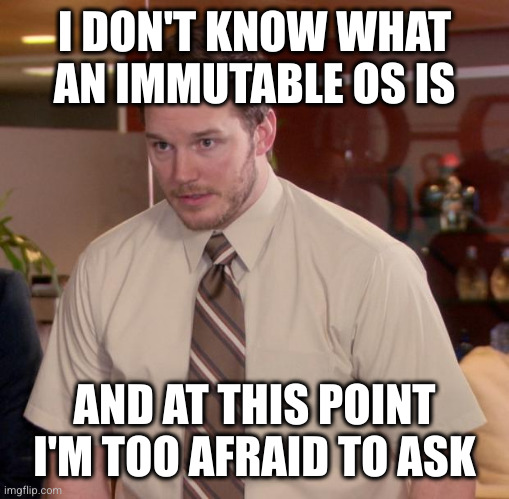this post was submitted on 24 Jul 2024
516 points (97.8% liked)
linuxmemes
21683 readers
1588 users here now
Hint: :q!
Sister communities:
Community rules (click to expand)
1. Follow the site-wide rules
- Instance-wide TOS: https://legal.lemmy.world/tos/
- Lemmy code of conduct: https://join-lemmy.org/docs/code_of_conduct.html
2. Be civil
- Understand the difference between a joke and an insult.
- Do not harrass or attack members of the community for any reason.
- Leave remarks of "peasantry" to the PCMR community. If you dislike an OS/service/application, attack the thing you dislike, not the individuals who use it. Some people may not have a choice.
- Bigotry will not be tolerated.
- These rules are somewhat loosened when the subject is a public figure. Still, do not attack their person or incite harrassment.
3. Post Linux-related content
- Including Unix and BSD.
- Non-Linux content is acceptable as long as it makes a reference to Linux. For example, the poorly made mockery of
sudoin Windows. - No porn. Even if you watch it on a Linux machine.
4. No recent reposts
- Everybody uses Arch btw, can't quit Vim, and wants to interject for a moment. You can stop now.
Please report posts and comments that break these rules!
Important: never execute code or follow advice that you don't understand or can't verify, especially here. The word of the day is credibility. This is a meme community -- even the most helpful comments might just be shitposts that can damage your system. Be aware, be smart, don't fork-bomb your computer.
founded 2 years ago
MODERATORS
you are viewing a single comment's thread
view the rest of the comments
view the rest of the comments

If the immutability in OS is well designed, then there shouldn't be really an downsides or loss in comfort. That is, unless you're a linux expert and like to tinker under the hood.
The general idea is, the core of the OS if read-only, and everything else that needs to be modified is mounted writeable. Ideally, protecting the core of the OS from writes, should for example prevent malware from installing a modified kernel or boot loader. Or maybe preventing the user from accidentally borking something so that their system becomes unbootable. How much of an advantage that is practice is dependent on use case. In the case of Steam OS on the steam deck, it's perfect, since boot issues on the steam deck could potentially be tricky to fix as opposed to a standard PC.
Another advantage of immutable could theoretically be wear and tear of certain storage devices. e.g. Think of a raspberry PI and SDcards. If you could have most of the important stuff of the OS as read only on the SD card, and everything else on a usb disk or even an NFS mount, then the SD card should last much longer since no writes are happening on it.
As far as true security benefit is concerned... I can't really say. It depends on how updates and eventual writes are actually handled to the immutable part of the OS. Obviously at some point, changes do happen. Like during a system update. In the case of Steam OS, The system portion is wiped and replaced the new version. Chimera OS, did something similar (I don't know if they still use the same method). They had a read-only BTRFS partition, where they would then provide a new snapshot during an update, which would be downloaded and applied at the next reboot. This approach would hinder automated crypto malware for example (at least for system files).
Thank you, then it looks like I'll be giving the atomic one a try! I can always overwrite and install normal Fedora KDE if the atomic version is giving me issues after all :)